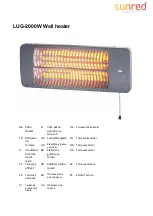
60
Servicing should only be performed by a Qualified Service Agent
TROUBLESHOOTING CODES
To support the recommended Troubleshooting, the R7910 has an Alert File. Review the Alert history for possible trends that may have
been occurring prior to the actual Lockout.
Note Column: H= Hold message; L=Lockout message; H or L= either Hold or Lockout depending on Parameter Configuration.
CODE
DESCRIPTION
RECOMMENDED TROUBLESHOOTING OF
LOCKOUT CODES
NOTE
Safety Data Faults
1
Unconfigured safety data
1.
New Device, complete device configuration and
safety verification.
2.
If fault repeats, replace module.
L
2
Waiting for safety data verification
1.
Device in Configuration mode and safety
parameters need verification and a device needs
reset to complete verification.
2.
Configuration ended without verification, re enter
configuration, verify safety parameters and reset
device to complete verification.
3.
If fault repeats, replace module.
L
Internal Operation Errors
3
Internal fault: Hardware fault
Internal Fault.
1.
Reset Module.
2.
If fault repeats, replace module.
H
4
Internal fault: Safety Relay key feedback error
H
5
Internal fault: Unstable power (DCDC) output
H
6
Internal fault: Invalid processor clock
H
7
Internal fault: Safety relay drive error
H
8
Internal fault: Zero crossing not detected
H
9
Internal fault: Flame bias out of range
H
10
Internal fault: Invalid Burner control state
L
11
Internal fault: Invalid Burner control state flag
L
12
Internal fault: Safety relay drive cap short
H
13
Internal fault: PII shorted to ILK
H or L
14
Internal fault: HFS shorted to LCI
H or L
15
Internal fault: Safety relay test failed due to
feedback ON
L
16
Internal fault: Safety relay test failed due to safety
relay OFF
L
17
Internal fault: Safety relay test failed due to safety
relay not OFF
L
18
Internal fault: Safety relay test failed due to
feedback not ON
L
19
Internal fault: Safety RAM write
L
20
Internal fault: Flame ripple and overflow
H
21
Internal fault: Flame number of sample mismatch
H
22
Internal fault: Flame bias out of range
H
23
Internal fault: Bias changed since heating cycle
starts
H
24
Internal fault: Spark voltage stuck low or high
H
25
Internal fault: Spark voltage changed too much
during flame sensing time
H
26
Internal fault: Static flame ripple
H
27
Internal fault: Flame rod shorted to ground
detected
H
28
Internal fault: A/D linearity test fails
H
29
Internal fault: Flame bias cannot be set in range
H
TABLE 12. TROUBLESHOOTING CODES
Summary of Contents for 100 Series
Page 2: ...2 Servicing should only be performed by a Qualified Service Agent...
Page 77: ...77 Servicing should only be performed by a Qualified Service Agent NOTES...
Page 78: ...78 Servicing should only be performed by a Qualified Service Agent NOTES...
Page 79: ...79 Servicing should only be performed by a Qualified Service Agent NOTES...
















































